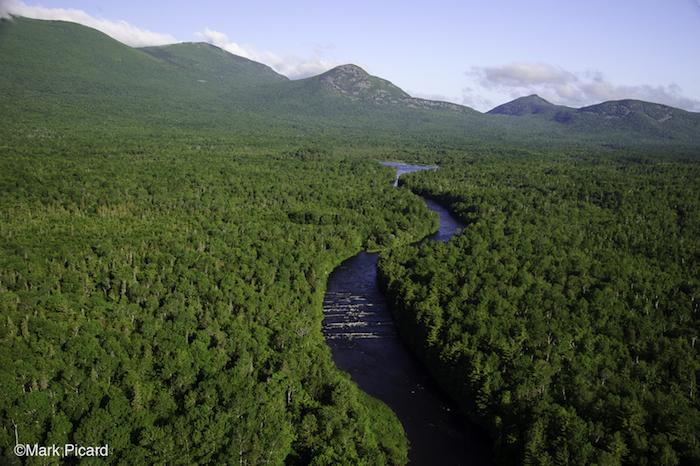
The fate of Katahdin Woods and Waters National Monument in Maine, and 26 other monuments across the country, should soon be known/Mark Picard
Those who read tea leaves likely are staring at hot swirling water as they try to predict how the Trump administration will come down on the fate of Bears Ears, Katahdin Woods and Waters, and 25 other national monuments. Conservationists maintain the president lacks authority to abolish monuments, while conservatives hope for drastic action by President Trump.
In Maine, U.S. Rep. Bruce Poliquin wants his state to be given managerial authority over Kathadin Woods and Waters, while in Utah, a leading proponent for rescinding the Bears Ears designation doubts that will happen. However, state Rep. Mike Noel, who wrote on his Facebook page that Interior Secretary Ryan Zinke would announce his position on Bears Ears this Saturday, opined that the monument would be reduced in acreage, not scapped altogether.
Back on April 26, President Trump signed an executive order directing the Interior Department to review national monuments designated by the last three presidents, going back to 1996 when President Clinton established Grand Staircase-Escalante National Monument in Utah via his authority under the Antiquities Act.
The case of Katahdin Woods and Waters is unique, as 87,900 acres for the monument was donated by Roxanne Quimby and her Quimby Foundation to the Interior Department to create the monument. Were the president or Congress somehow able to rescind the designation bestowed by President Obama, who would manage the land, as it would still be in the Interior Department's public lands portfolio?
Rep. Poliquin, though stopping short of directly asking Secretary Zinke to push for the monument to be abolished, did ask that Maine be put in charge of managing it.
"Maine knows best how to manage its land and abundant natural resources," the Republican from Maine's 2nd Congressional District wrote to the secretary on Monday. "Whatever the President decides regarding the national monument, I respectfully request the State be responsible for managing the land and its many uses -- not Washington."
The representative also implied in his letter (attached below) that the roads in and around the monument are not the safest for motorists visiting Katahdin Woods and Waters because of logging trucks.
"The often narrow, hilly, and winding gravel logging roads in the area MUST continue to stay open for active commercial use. They provide critical access to the rich wood fiber which is sustainably harvested and transported to Maine paper and saw mills and other wood product manufacturers," wrote Rep. Poliquin. "Passenger and recreational vehicles must be able to coexist with huge 100,000-pound logging trucks which normally ride down the middle of the roads and cannot easily stop. Safety for all must be a key consideration."
And while the politician said Maine's legislature, its governor, and citizens in three towns surrounding Katahdin Woods and Waters opposed the national monument, a local businessman from the region said that was misleading.
"In fact, multiple polls showed the vast majority of Mainers supported federal land protection initiatives in the Katahdin region. A survey done shortly after the national monument designation found that support for Katahdin Woods and Waters had reached 72 percent statewide and two-thirds of Mainers in the 2nd Congressional District, where the monument is located, support the designation," James Talbott, owner of the Millinocket radio station WSYY, wrote in an opinion piece published Wednesday in the Portland Press Herald.
Meanwhile, across the country in Utah, Rep. Noel was resigned that the 1.3-million-acre Bears Ears would continue in some form after Secretary Zinke's review.
"I think it will be reduced, most likely,” Mr. Noel told UtahPolicy. "It could be rescinded, but that is less likely.”
At the Property and Environment Research Center in Bozeman, Montana, research fellow Shawn Regan hoped that if nothing else, the Interior secretary's review process would lead to revisions to the Antiquities Act.
"The monument review process presents an opportunity for Secretary Zinke to help reevaluate the recent use of the Antiquities Act as a heavy-handed, large-scale conservation policy, which is not what the law, as passed in 1906, was designed to do," he told the Traveler in an email Wednesday. "The act allows presidents to run roughshod over the legislative process that is at the core of American governance while undermining compromise and ignoring local input. The review process could help clarify the scope of the act and encourage Congress to reform this antiquated law. Ideally, the process will also prompt discussions over alternative ways to protect and manage these lands that allow for more local control and flexibility."

A Utah politician is guessing that Bears Ears National Monument will be downsized, but not abolished/BLM






Comments
Great article! As a 5th generation Mainer, I fully support Katahdin Woods and Waters National Monument.